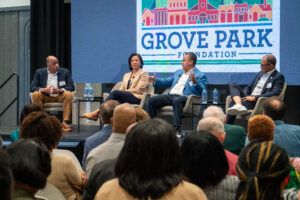The May 17 Transform Westside Summit brought together a diverse group of stakeholders to discuss the balance between affordable and market-rate housing in creating vibrant, healthy and inclusive neighborhoods and highlighted the neighborhood revitalization efforts of the Grove Park Foundation. Candace Wheeler, Communications Manager, Westside Future Fund, and Ebony Ford, Director of Community Building & Engagement, Quest Community Development Corporation, opened the Summit with connection and community building, where attendees shared resources for the group’s collective efforts to improve the Westside. TJ Austin, Board Chair, Grove Park Foundation, led the devotion.
The panel, moderated by Gavin McGuire, Executive Director, Grove Park Foundation, featured Carmen Chubb, Principal & President, Columbia Residential; Robert “Robb” Jones, Managing Partner, Cityscape Housing; and Larry Stewart, Managing Director, E-StreetTeam, LLC.
Balancing Affordable and Market-Rate Housing
One of the key discussions revolved around the integration of affordable and market-rate housing within mixed-use developments. This approach is seen as crucial to fostering vibrant, economically diverse communities. The panelists shared their experiences and insights on how this balance can be achieved and the benefits it brings.
Carmen Chubb emphasized the importance of understanding and addressing the perceptions associated with affordable and market-rate housing. She highlighted that affordable housing often includes a range of incomes and should not be perceived negatively. Chubb advocated for creating cohesive communities that accommodate various income levels, promoting inclusivity and support systems.
Robert Jones discussed the necessity of both affordable and market-rate housing to address the broader housing supply issue. He pointed out that mixed-income communities foster social cohesion and provide opportunities for homeownership across different income levels. Jones also mentioned the creative challenges developers face in today’s high-cost environment, which necessitates innovative housing solutions.
Larry Stewart called for dismantling the misconception that market-rate housing equates to luxury. He highlighted the need for a diverse housing stock that serves all income levels and fosters healthy neighborhoods. Stewart stressed that affordable housing should be seen as a stepping stone to homeownership and economic upliftment.
Community Engagement and Partnerships
The panelists underscored the critical role of community engagement in the development process. Chubb shared her experiences growing up in a mixed-income neighborhood, emphasizing how diverse communities provide support and inspiration. She also noted the importance of respecting existing communities and involving them in the development process to ensure their needs and values are considered.
Jones echoed this sentiment, recounting his early experiences in community development and the essential role of community members in monitoring and safeguarding development projects. He stressed that developers must prioritize community engagement to build trust and ensure that projects meet the needs of both new and existing residents.
Stewart highlighted the importance of public-private partnerships in accelerating housing development. He mentioned recent organizational changes at the Atlanta Housing Authority aimed at enhancing their capacity to support more housing projects through collaboration with private developers.
Moving Forward
The Summit concluded with a recognition that the conversation around housing diversity is just beginning. As McGuire noted, the Summit served as a platform to start addressing these complex issues, with plans for ongoing dialogue and engagement with the community.
Miss the event? Watch the full Transform Westside Summit on YouTube.

